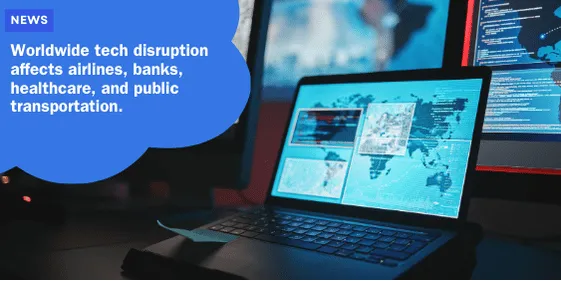Worldwide tech disruption affects airlines, banks, healthcare, and public transportation.

On Friday, a significant global technology outage wreaked havoc across multiple sectors, including airlines, banks, healthcare, and public transportation.
This widespread incident has been linked to a faulty system update, as reported by CrowdStrike, a prominent U.S.-based cybersecurity firm.
According to CrowdStrike, the defective update impacted Microsoft’s Windows Operating System but was not associated with any security breach or cyberattack.
Airline Industry Grounded
The airline industry was one of the most affected sectors by the tech outage. Hundreds of flights across the U.S. were canceled early Friday morning, as major carriers like American Airlines, Delta Air Lines, and United Airlines grounded their flights.
This disruption came shortly after Microsoft announced that it had resolved a cloud-services-related outage affecting several low-cost carriers.
As the day progressed, many airlines managed to resume operations, but passengers continued to experience significant delays and cancellations.
Public Transit Systems Impacted
Public transportation systems also felt the impact of the global tech failure. In the U.S., several public transit systems reported disruptions, which compounded the travel woes for many commuters.
The extent of the disruptions varied, with some transit services experiencing delays and technical issues.
Global Market and Media Disruptions
The ramifications of the tech outage extended beyond the U.S. London’s Stock Exchange experienced disruptions, affecting trading activities.
Additionally, major train delays were reported across the U.K., and British broadcaster Sky News went off-air temporarily due to the incident.
In Europe, healthcare facilities were forced to cancel non-emergency services and adjust operations to manage the impact of the outage.
Education Sector Affected
Despite the summer break, educational institutions were not immune to the effects of the global tech disruption.
Colleges and universities, including the University of Rochester and the University of Alabama, faced issues with their computer systems, leading to disruptions in administrative operations.
Moreover, K-12 schools in Maryland and Kansas reported problems with PowerSchool, a widely used software for student enrollment and grading.
The outage affected various components of the system, including enrollment features, creating challenges for schools preparing for the upcoming academic year.
911 Call Centers and Emergency Response
Emergency services were also impacted by the global tech outage.
Various state and local law enforcement agencies in the U.S. experienced problems with 911 call centers, though many of these centers have now been restored.
In the Phoenix area, some of the largest police agencies and healthcare providers experienced difficulties with emergency response systems.
Emergency dispatchers had to rely on manual methods, such as writing information on paper, to communicate with first responders.
Federal Response and Presidential Briefing
President Joe Biden has been briefed on the global tech outage, and his administration is in contact with CrowdStrike and other affected entities.
The White House is coordinating with federal agencies and companies to assess the situation and mitigate the impact of the disruption.
Flight Cancellations and Delays in the U.S.
In the U.S., more than 1,700 flights were canceled and over 4,400 flights were delayed as of 11 a.m. EDT, according to flight-tracking website FlightAware.
This massive disruption led to the issuance of ground stops by several U.S. carriers, including American Airlines, Delta Air Lines, and United Airlines.
Although airlines began resuming operations as the day progressed, travelers continued to face disruptions and delays throughout the day.
CrowdStrike’s Apology and Impact on Healthcare
George Kurtz, CEO of CrowdStrike, issued an apology for the disruptions caused by the tech outage.
The impact on healthcare was significant, with hospitals across the U.S. and internationally forced to cancel non-emergency services.
Mass General Brigham in Boston, for example, had to cancel previously scheduled elective surgeries and medical visits.
Tufts Medical Center is still evaluating the outage’s impact on its clinical and surgical operations.
The Fragility of Internet Infrastructure
The widespread nature of this tech outage has highlighted the fragility of modern internet infrastructure.
Analysts are describing the incident as one of the most extensive outages ever experienced, raising concerns about the vulnerability of critical systems and services.
The ripple effects of the outage have been felt across various sectors, underscoring the need for robust infrastructure and contingency planning.
Global Effects and Sectoral Disruptions
From the U.K. to Singapore, the tech outage had far-reaching effects.
In the U.K., the departure boards at several airports froze, and train companies reported prolonged delays.
London’s Stock Exchange and several retail stores also faced disruptions.
The office of Australia’s National Cyber Security Coordinator has stated that there is no indication of a cybersecurity incident being involved.
In New York, the Metropolitan Transportation Authority reported that some of its systems were offline due to the global tech disruption.
However, it noted that MTA train and bus services were unaffected, providing some relief to commuters.
Conclusion
In summary, the global tech disruption on Friday had extensive and varied impacts across multiple sectors.
From grounded flights and halted public transit to disruptions in healthcare and education, the incident highlighted the interconnectedness and vulnerability of modern infrastructure.
As affected entities work to restore normal operations, the incident serves as a reminder of the importance of resilient systems and effective contingency plans in managing technological disruptions.






